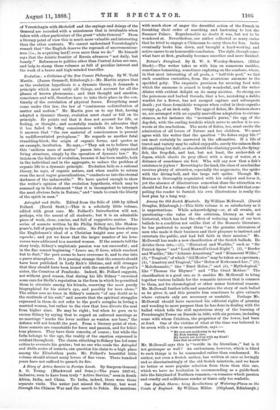Astrophel and Stella. Edited from the folio of 1598 by
Alfred Pollard. (David Stott.)—This is a scholarly little volume, edited with great care. Mr. Pollard's Introduction will not, perhaps, win the assent of all students ; but it is an admirable piece of work, clear, concise, and full of suggestive matter. The series of sonnets written by Sir Philip Sidney are, like Shakes- peare's, full of perplexity to the critic. Sir Philip has been always the Englishman's ideal of a Christian knight sans peur et sans reproche ; and yet we know that the larger number of his love- verses were addressed to a married woman. If the sonnets tell the story truly, Sidney's unplatonic passion was not successful ; and in the fine sonnet beginning " Leave me, 0 Love, which reachest but to dust," the poet seems to have overcome it, and to rise into a purer atmosphere. It is passing strange that the sonnets should have been published in Lady Rich's lifetime, and still stranger that they should have been issued with the sanction of the poet's sister, the Countess of Pembroke. Indeed, Mr. Pollard suggests, not without good reason, that during his life Sidney " exercised some care for Stella's reputation in the form in which he permitted them to circulate among his friends, reserving the most purely biographical for his sister's eye, and possibly for hers alone." The editor sees no trace in Sidney's sonnets "of any doubt as to the rectitude of his suit," and asserts that the spiritual struggles expressed in them do not refer to the poet's scruples in loving a married woman, but rather to the view that love diverts the soul from higher aims. He may be right ; but when he goes on to excuse Sidney by saying that to regard an enforced marriage as no marriage " marks the lover neither as wanton nor base," the defence will not benefit the poet. From a literary point of view, these sonnets are remarkable for force and passion, and for felici- tous phrases. They have their conceits, of course ; but while the forin belongs to the age, the reality of the emotion expressed is evident throughout. The charm attaching to Sidney has led some critics to overrate his genius ; but no one who reads the Astrophel and Stella series of sonnets, can question his claim to a high place among the Elizabethan poets. Mr. Pollard's beautiful little volume should attract many lovers of fine verse. Three hundred years have not sufficed to quench its fire.


































 Previous page
Previous page